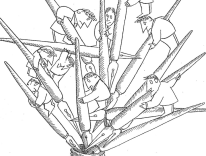We have two new web exclusives featured on the homepage. First, in "The Duplicity of the Ideologues," Andrew J. Bacevich responds to Robert Kagan's recent New Republic essay, "Superpowers Don't Get to Retire."
Writing in the New York Times, columnist David Brooks hails Kagan’s New Republic essay as “brilliant.” A more accurate appraisal would be slickly mendacious. Still, Kagan’s essay also qualifies as instructive: Here in some 12,700 carefully polished words the impoverished state of foreign-policy discourse is laid bare. If the problem hobbling U. S. policy is an intellectual one, then Kagan himself, purveyor of a fictive past, exhibits that problem in spades.
That Robert Kagan, a bona fide Washington insider, currently housed at the Brookings Institution, possesses very considerable talents is doubtless the case. A well-regarded historian, he is also a skilled polemicist and an ideologue. Here he combines all three callings to fashion a historical narrative that advances two claims. The first enshrines the entire period since 1945—until Obama sounded retreat anyway—as a kind of golden age when freedom, democracy, and liberal values flourished as never before. The second attributes this golden age almost entirely to enlightened American leadership. Policymakers in Washington, he writes, manifested a “sense of global responsibility that equated American interests with the interests of many others around the world.”
Neither one of these claims stands up to even casual scrutiny. Rather than describing the prevailing realities of the post-1945 era, phrases like “world order” and “global responsibility” obfuscate. Purporting to clarify, they merely gloss over. Kagan employs these as devices to beguile, while constructing a version of “truth” that ignores inconvenient facts. There’s a name for this technique: It’s called propaganda.
Read the whole thing here.
In "The Italian Job," Massimo Faggioli asks how Francis, as he seeks to reform the Curia, might be able to manage the bishops in Italy.
Francis’s first year has been characterized by a carefully coded fight for the ground between the old guard and the new. An abstract debate about the “continuity or discontinuity” of Vatican II has been replaced by a conversation about concrete issues such as poverty and inequality. Francis has shown a willingness to discontinue old practices—for example, the Vatican officially prohibits priests from washing women’s feet on Holy Thursday, but that’s exactly what he did just weeks after his election. Francis’s new language and style have not been universally welcomed by the bishops, especially those in his backyard. Some of them silently resist these changes.
In Italy, for example, the old guard seems especially recalcitrant. The most prominent Italian bishops—the cardinals of Venice, Milan, Turin, Genoa, Florence, Naples, and Palermo—were all appointed by John Paul II or Benedict XVI. Now it seems that many of the most powerful and visible Italian bishops have little to say about Francis’s agenda. Only Cardinal Carlo Caffarra of Bologna—a drafter of John Paul’s most important document on life issues—has been willing to publicly comment, if only to oppose Cardinal Walter Kasper’s proposal to allow some divorced and remarried Catholics to receive the Eucharist. The rest of the Italian bishops have been more or less absent from the public debate about family and marriage in advance of next October’s episcopal Synod.
Read the whole thing here.


